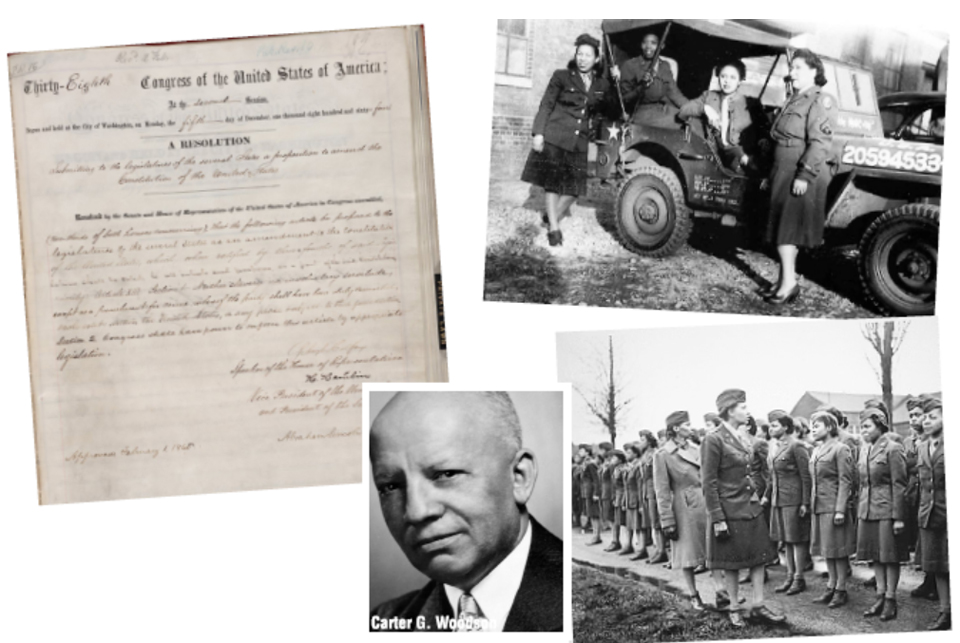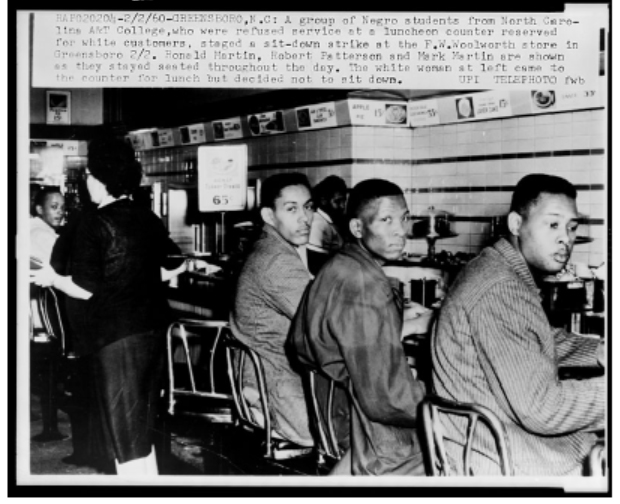February Black History Sampler — ONE

"We should emphasize not Negro History, but the Negro in history. What we need is not a history of selected races or nations, but the history of the world void of national bias, race hate, and religious prejudice." -Carter Woodson
Carter G. Woodson was a driven historian who cared tremendously about the history and legacy of Black people.
He firmly believed that Black people needed to know more about their accomplishments in America.
Woodson was born into sharecropping but later went to the University of Chicago and earned bachelor's and master's degrees. Then he went to Harvard, where in 1912, he became the second African American to receive a doctorate there.
W.E.B. DuBois was the first.
In 1915 Woodson became a founding member of the Association for the Study of Negro Life and History (ASNLH), which was started in Chicago to highlight Black achievement.
And in 1916, he started a scholarly publication called the Journal of Negro History, published today as the Journal of African American History.
He was a sought-after speaker, teacher, historian, and author. In 1924 Woodson worked with his fraternity Omega Psi Phi to start the Negro History and Literature Week.
In February 1926, Carter G. Woodson started Negro History Week.
Then in 1926, he expanded that work by collaborating with the ASNLH, which had several branches, and launched Negro History Week. In 1976, it became the month-long celebration now known as Black History Month Woodson never meant to limit the study of African American history to a single week or even a month. He just found a way to highlight the achievements of Black Americans.
This month in honor of Carter G. Woodson, we will highlight some historical and biographical facts regarding Black people in America.
However, to show the vastest of Black accomplishments, we will only highlight people, events, and milestones that occurred during the 28 days in February. This article is the first of that series.
February 1-7
February 1, 1865 — The 13th Amendment to the U.S. Constitution, which abolished slavery, was approved and signed by President Lincoln. It was not ratified until December 6, 1865. You may think that the Emancipation Proclamation, which Lincoln issued in 1863, freed slaves, and it did. Still, it was not guaranteed until the constitutional amendment was signed.
February 1, 1960 --Greensboro, North Carolina — Four African American students from North Carolina A&T staged sit-ins at a Woolworth Store.
The students sat at the lunch counter but were refused service; so, they stayed there until the store closed. They returned the next day and the next day.
At one point, there were 300 protesters in the store, including some white students from the Women's College of the University of North Carolina.
Then the organizers started a broader boycott of stores and restaurants with segregated lunch counters. The protests hurt sales in the town drastically, and on August 1, the four students, who began the sit-in, went back to Woolworth's and were allowed to eat lunch at the counter. This nonviolent protest is said to have been the inspiration for SNCC, the Student Nonviolent Coordinating Committee.
February 1, 1978 — Harriet Tubman became the first Black woman to be pictured on a U.S. stamp.
February 3, 1903 — Jack Johnson became the first African American to win a heavyweight title fight in boxing.
February 3, 1945 — The 6888th Battalion, a group of 824 Black women serving in the Army during World War II, was sent to England. The Battalion, called the Six Triple Eight, was shipped to Birmingham to sort mail and packages sent to the U.S. military, government officials, and volunteers in Europe during wartime. The group was a part of the Women's Army Corps (WAC) under President Franklin D. Roosevelt. The 6888th Battalion was extremely successful; they eliminated a backlog of millions of pieces of mail. They created a tracking system with more than seven million entries to ensure that soldiers fighting in the war got their mail. Their motto was "No mail, low morale."
February 4, 1913 — Civil Rights pioneer Rosa Parks was born in Tuskegee, Alabama.
February 5, 1866 --After the Civil War, Congressman Thaddeus Stevens of Pennsylvania offered an amendment to the Freedmen's Bureau Bill authorizing that land be given to freed slave refugees. This proposal was nullified by President Andrew Jackson but is the basis for the saying "40 acres and a mule."
February 6, 1820 — The first known organized group of freed slaves got on a boat in New York to sail back to Africa. Assisted by the American Colonization Society (ACS), 86 men and women traveled back to Sierra Leone. In 1822, the ACS started resettling freed slaves from America to Liberia, just south of Sierra Leone. By the end of the Civil War, ACS had transported 15,000 freed slaves to Liberia.
February 7, 1926 — Negro History Week, started by Carter G. Woodson, is observed for the first time. It became Black History Month in 1976.
"Those who have no record of what their forebears have accomplished lose the inspiration which comes from the teaching of biography and history." — Carter G. Woodson
Let's learn together. Stay tuned.
Sophia Brewer (M.L.I.S.) is Collection Development and Serials Librarian, Grand Rapids Community College; Co-President of the Greater Grand Rapids History Council; member of the Grand Rapids Study Club and serves on the Grand Rapids Public Library, Board of Library Commissioners (Elected 2016-2021). She is a former Head of Programs, Grand Rapids Public Library and former Branch Manager, Madison Square Branch, Grand Rapids Public Library

Tagged in: